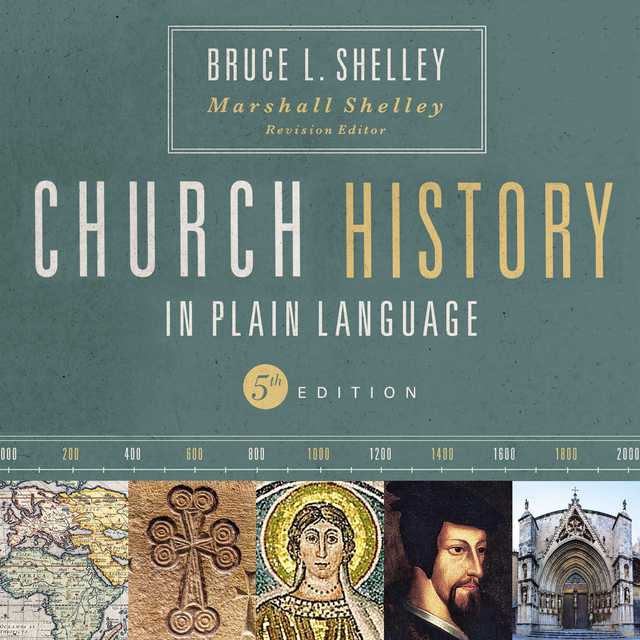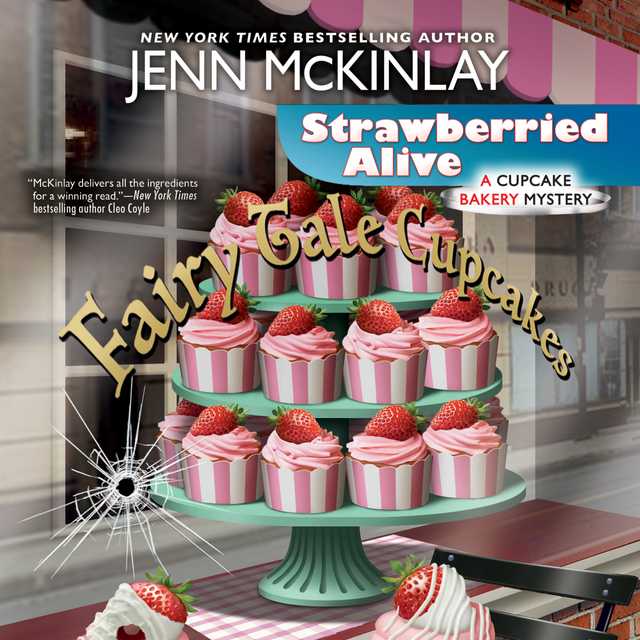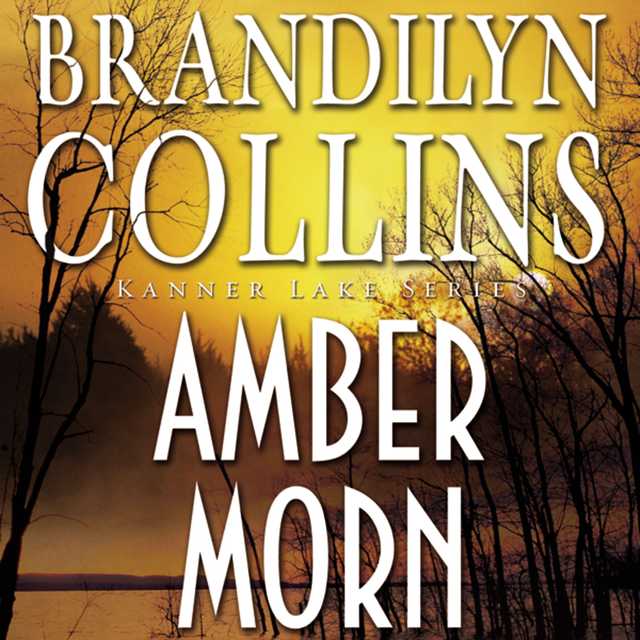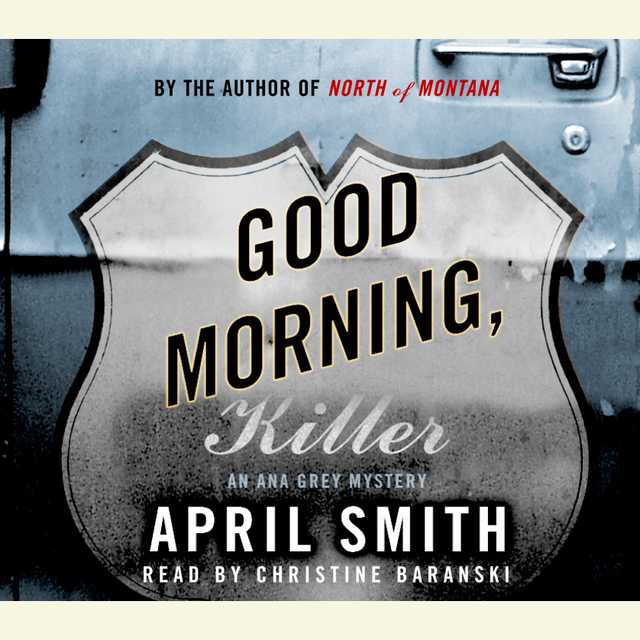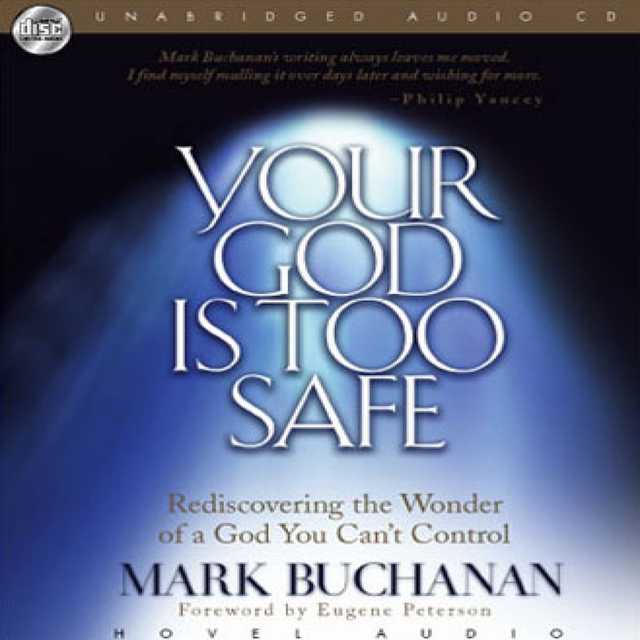Church History in Plain Language, Fifth Edition Audiobook Summary
Over 330,000 copies sold. This is the story of the church for today’s listeners.
Bruce Shelley’s classic history of the church brings the story of global Christianity into the twenty-first century. Like a skilled screenwriter, Shelley begins each chapter with three elements: characters, setting, plot. Taking you from the early centuries of the church up through the modern era he tells a story of actual people, in a particular situation, taking action or being acted upon, provides a window into the circumstances and historical context, and from there develops the story of a major period or theme of Christian history. Covering recent events, this book also:
- Details the rapid growth of evangelical and Pentecostal Christianity in the southern hemisphere
- Addresses the decline in traditional mainline denominations
- Examines the influence of technology on the spread of the gospel
- Discusses how Christianity intersects with other religions in countries all over the world
For this fifth edition, Marshall Shelley brought together a team of historians, historical theologians, and editors to revise and update this father’s classic text. The new edition adds important stories of the development of Christianity in Asia, India, and Africa, both in the early church as well as in the twentieth and twenty-first centuries. It also highlights the stories of women and non-Europeans who significantly influenced the development of Christianity but whose contributions are often overlooked in previous overviews of church history.
This concise book provides an approachable guide to church history with intellectual substance. The new edition of Church History in Plain Language promises to set a new standard for accessible church history.
Maps, timelines, suggested reading, and end notes are available in the audiobook companion PDF download.
Other Top Audiobooks
Church History in Plain Language, Fifth Edition Audiobook Narrator
Bruce Shelley is the narrator of Church History in Plain Language, Fifth Edition audiobook that was written by Bruce Shelley
About the Author(s) of Church History in Plain Language, Fifth Edition
Bruce Shelley is the author of Church History in Plain Language, Fifth Edition
More From the Same
Church History in Plain Language, Fifth Edition Full Details
| Narrator | Bruce Shelley |
| Length | 23 hours 25 minutes |
| Author | Bruce Shelley |
| Category | |
| Publisher | Zondervan Academic |
| Release date | July 13, 2021 |
| ISBN | 9780310116004 |
Subjects
The publisher of the Church History in Plain Language, Fifth Edition is Zondervan Academic. includes the following subjects: The BISAC Subject Code is Christianity, History, Religion
Additional info
The publisher of the Church History in Plain Language, Fifth Edition is Zondervan Academic. The imprint is Zondervan Academic. It is supplied by Zondervan Academic. The ISBN-13 is 9780310116004.
Global Availability
This book is only available in the United States.
Goodreads Reviews
Andrea
January 01, 2020
Although long, this book is broken into short chapters and is written in a style that makes it easy to read. It gives an overview of Church history from Christ to the current age discussing major themes, events, people, etc. It was kind of like drinking from a fire hose, but it was helpful. I'm slowly building on my church history context and this book was a great aid to that. It's fairly neutral (although it assumes that the reader will be at least sympathetic to the Church; in the end it talks about "who we are" which seems to imply he wrote for the benefit of other believers). There were a couple parts (like when discussing dispensationalism and cessationism) that the author used less than neutral terms and I think readers would probably pick up on biases in the book depending on their own background/beliefs. I read one review that complained that it skewed toward protestantism. The author writes a lot about Catholicism, its developments and it impact over the centuries. Of course, as a protestant, I'm fairly satisfied with how Catholicism was handled in the book, but it probably does lean more heavily in the direction of protestantism (which I would expect from an author who is protestant). This is not a history of the Catholic church. I'm not sure the best way to read this book. I know I will forget a lot of what I read. It's just too much and the dates, names, events, movements, etc. for 2000 years of history boggle the mind. The author divides the book into different ages and I think it would be useful to spend some time in each of the ages to solidify the main themes before moving on. I didn't have time for that with this reading, but I think it would work well in a classroom where it could be discussed and coordinated with other supplemental material. A couple things I didn't really like were that there are no notes so things are quoted without reference to the source. I shouldn't say there are no notes. For this size of a book there is an astonishingly small amount of end notes at the back, but since there's no reference to the notes in the chapter itself, you have no idea in the end notes which thought the note refers back to. Each chapter ends with a list of suggested reading titles and I guess I assume that the content from each chapter is for the most part sourced from that reading list. While this system makes the text probably feel more casual and less intimidating, I don't really like not knowing where the author is getting his facts. However, I did like the suggested reading list and that it was specific to each chapter. I think is helpful for developing the material for a class or for choosing certain themes/time periods to study further. The other thing that I didn't really like (but that is probably inevitable) is that despite the chronological structure of the book, I still felt like things jumped around a little bit with the chapters and sometimes I felt confused about who was doing what and when. I don't really think this can be completely avoided. I've noticed it in lots of other history books, but there were a few times where I got a little lost or felt like I needed to backtrack.Overall, this provides an easy to read (the "plain language" title really fits), comprehensive (but not exhaustive) history of the church and I appreciated it. I would recommend it across the spectrum although most people will probably have a beef here and there with how certain aspects are covered. I think that is to be expected with this sort of overview.
David
February 22, 2019
A really good brief summary of the history of the church. Enjoyed reading this book a lot.
Jake
March 17, 2018
Best church history material I've come across. Well organized, informative, detailed, and written in a way that won't put you to sleep. Love this books. Highly reccomend.
Cathryn
March 18, 2022
Very informative and easy to understand…not overly scholarly.
Lauren
July 17, 2022
I really can't more highly recommend this book for those looking for an overview of Church History. I might even go so far to say it should be required reading for believers at some point in their sanctification journey, at the least, a church history book of some sort, though I think this one is excellent. I commonplaced endlessly and this book really secured my mental historical timeline. I think one of the most living ideas for me that I found in this book was that Christianity as a whole requires navigating the tension of being both a movement and an institution. When the Spirit moves and many come to faith, the organizational and structural needs increase; however, when the institution begins to impede the movement of the spirit, reformation and revival is needed. I can now see this repeated at so many times throughout church history. I think studying church history gives the believer such confidence to navigate whatever historical period that the Lord saw fit to have them born into. The bride of Christ will endure in the midst of heresies, war, ideologies, etc. until His return.
Brent
July 12, 2021
A good introduction to church history. Very readable. Although it's quite long, it doesn't go into great depth about any of the events it discusses. But neither does it sweep past them so quickly that they are no longer memorable. Shelley exercises constraint in choosing to discuss a smaller number of events in more detail than to discuss a larger number of events in less detail. I think this is the right approach. My only real complaint comes with the final few chapters where Shelley talks about Christianity in modern times. This part contains very little narrative of specific events and instead contains nebulous summaries of various denominations and trends in the modern world--very dull compared to the rest of the book.Update: I just finished reading Needham's 2,000 Years of Christ's Power, and that book trumps this one. If you're looking for an accessible and thorough account of church history, go with Needham.
Todd
May 25, 2022
As a Baptist pastor, I've read a number of Baptist history books over the years as well as a number of biographies of various men—some Baptist and some not. I knew I needed to read a more general book on Christian history and Shelley's is probably the most widely acclaimed. Dr. Shelley was a Christian. However, he wrote this book more as an outsider looking in. As a result, he uses the words "church" and "Gospel" more broadly than I assume he'd have used it in either the classroom or the pulpit. He also used "pope" earlier than I think the actual modern day office of "pope" existed. I assume he did this simply because of the point of view from which he wrote. This work is not intended to make theological arguments for or against any certain group, but simply to inform of progress under the "Christendom umbrella" from the days of Christ until now. This book is a very easy read. It may be the easiest history book I've ever read. I never struggled to pick it up. I appreciated that he started with the ministry of Jesus. The book ends post 9/11. So, it comes all the way up to our present generation. You'll even find men like Jerry Falwell and Billy Graham along with J.R.R. Tolkien and C.S. Lewis mentioned. I'm so glad I chose to read this book. Given the Baptist history books I've read, this helped to paint a much bigger picture as it weaved political history and church history throughout the centuries. If you're looking for a book on the history of the Christian faith from a more general vantage point, this book is worthy.
Lindsay
September 03, 2019
Outside of the Bible, I have not read another book that better helped me understand my faith. It is a frustrating time in the church right now, yet what we are experiencing is not new. I’ve never learned the context behind the denomination I am in versus all of the other denominations throughout history. I now know that my faith in this time period is not a blip on the church timeline but is instead part of a long story of a blemished body of believers constantly being wooed back to truth throughout the ages. The context this book has given to me in regards to the global story of the church is priceless. This is a book is one I will probably go back and read (listen to) every year.
Esther
January 12, 2021
I love this book! It has really shaped my faith in ways I didn’t even know were possible. The panoramic view of the church throughout history has given me so much perspective. I would highly recommend this to all millennial believers.
Elysia
February 13, 2022
Excellent read. Engaging and informative. I expected a dry historical tome but found it addressed a lot of my questions about the source of the creeds, when in history various splits occurred. The only reason I’m giving 4 stars is that I haven’t read enough to compare the claims of this book (for example how political moments shaped the church). The author is distinctly Protestant, but still spoke with respect about other traditions. Have already recommended this book to several friends.
Ethan
June 11, 2020
The first 75% of this book was great! It started to feel much more disjointed and incoherent the later into the history of the church he went. Didn't read the last few chapters because I felt I wasn't really learning anything after a certain point. I would definitely recommend if you're looking to learn more about church history through the 1700s or so. Especially enjoyed the sections on the early and medieval church.
Simo
October 14, 2017
The book is a good introduction to Christian history (inside and outside of the church). It's easy to read and a little bit long but that's okay because Christianity has a long history.The author wrote the book from the christian POV. He said it in the beginning that the book is destined to the average christian who is ignorant of the history of Christianity. So while reading the book , I felt that Mr Shelley was on the defensive (read apolegitic), espeacially when he talks about "heritics", the age of reason's thinkers, liberal christians, communists and secularists. At the end he becomes nostalegic when he talks about the decline of the church in Europe.But overall I learned a lot about the history of the church, different movements and couter-mouvements and the never ending list of denominations.
Nicholas Bradley
October 12, 2007
This book helps you to palm church history and teach you about groups of people that are simply not remembered in every day life. It goes into where certain traditions and doctrines came from and how we as the Ecclesia all fit into this crazy world. It talks about doctrine to a fair degree and explores greatly where a lot of these doctrines came from. It is VERY understandable and is organized in such a way that you can either read straight through like a timeline (although it is a little jumpy) OR you can look up certain groups of people in history and read all about their origins. I highly recommend this book to anyone who is at all interested in the history of the church. Enjoy.
Jeff
February 27, 2018
Fantastic! I finished this book with a sense of awe at the work of God, the Architect and Builder of the Church. I also gained a more gracious and inclusive perspective of my fellow Christians in sundry traditions and denominations here and abroad.
Melissa
December 17, 2012
FANTASTIC survey of Church history! Reads like an epic novel. EVERY Christian should invest the time to read this!
Chip
March 03, 2020
An impressive condensation of 2000 years of history into 520 pages (just about 4 years per page when you think about it), Shelley and Hatchett do an admirable job of making the great advances of Christian thought easy to understand. This is clearest when writing about the early church councils and the Reformers, with theological conflicts carefully explained, and some clever supplemental material with genuinely helpful tables and charts. Shelley is never shy about his perspective, and any evangelical reader will leave this book with an enriched appreciation of the heritage of their theology.Two complaints: first, Shelley's theology can overwhelm the history. Especially during centuries preceding the Reformation, the reader is placed less in the shoes of a 12th century Catholic than in the seat of a 2nd year seminarian in an evangelical college. This relatively blatant bias does diminish any work of history, and I'd be fascinated to see what a modern Catholic scholar would make of Shelley's characterisation of their church.Second, while the language is accessible and the explanations clear, the book seldom moves into the genuine storytelling that distinguishes great history. This is probably a necessary constraint, you can't compress such a vast subject into even 520 pages without streamlining a lot of points of interest, but nevertheless it made for a less engaging read than I would have liked.
Frequently asked questions
Listening to audiobooks not only easy, it is also very convenient. You can listen to audiobooks on almost every device. From your laptop to your smart phone or even a smart speaker like Apple HomePod or even Alexa. Here’s how you can get started listening to audiobooks.
- 1. Download your favorite audiobook app such as Speechify.
- 2. Sign up for an account.
- 3. Browse the library for the best audiobooks and select the first one for free
- 4. Download the audiobook file to your device
- 5. Open the Speechify audiobook app and select the audiobook you want to listen to.
- 6. Adjust the playback speed and other settings to your preference.
- 7. Press play and enjoy!
While you can listen to the bestsellers on almost any device, and preferences may vary, generally smart phones are offer the most convenience factor. You could be working out, grocery shopping, or even watching your dog in the dog park on a Saturday morning.
However, most audiobook apps work across multiple devices so you can pick up that riveting new Stephen King book you started at the dog park, back on your laptop when you get back home.
Speechify is one of the best apps for audiobooks. The pricing structure is the most competitive in the market and the app is easy to use. It features the best sellers and award winning authors. Listen to your favorite books or discover new ones and listen to real voice actors read to you. Getting started is easy, the first book is free.
Research showcasing the brain health benefits of reading on a regular basis is wide-ranging and undeniable. However, research comparing the benefits of reading vs listening is much more sparse. According to professor of psychology and author Dr. Kristen Willeumier, though, there is good reason to believe that the reading experience provided by audiobooks offers many of the same brain benefits as reading a physical book.
Audiobooks are recordings of books that are read aloud by a professional voice actor. The recordings are typically available for purchase and download in digital formats such as MP3, WMA, or AAC. They can also be streamed from online services like Speechify, Audible, AppleBooks, or Spotify.
You simply download the app onto your smart phone, create your account, and in Speechify, you can choose your first book, from our vast library of best-sellers and classics, to read for free.
Audiobooks, like real books can add up over time. Here’s where you can listen to audiobooks for free. Speechify let’s you read your first best seller for free. Apart from that, we have a vast selection of free audiobooks that you can enjoy. Get the same rich experience no matter if the book was free or not.
It depends. Yes, there are free audiobooks and paid audiobooks. Speechify offers a blend of both!
It varies. The easiest way depends on a few things. The app and service you use, which device, and platform. Speechify is the easiest way to listen to audiobooks. Downloading the app is quick. It is not a large app and does not eat up space on your iPhone or Android device.
Listening to audiobooks on your smart phone, with Speechify, is the easiest way to listen to audiobooks.

